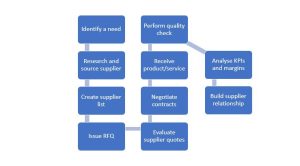Physical Address
304 North Cardinal St.
Dorchester Center, MA 02124

When it comes to finding a supplier or manufacturer, you can source from local companies or you can go global. Both methods have their own pros and cons, so to help you understand the main differences between the two, we’re going to explain why you might want to keep things local and when to take advantage of the global supply chain.
Local sourcing refers to the sourcing of products or materials from manufacturers within your home country. Instead of reaching out to international supplies, you instead choose to buy from local manufacturers.
Shopping local can often come at a price. Choosing to invest in a manufacturer from your home country can involve higher prices than if you were to invest internationally. However, local sourcing can be easier too and faster. If you are in demand of a quick turnaround, it might make sense to source from a local supplier who can produce products and deliver within a certain timeframe, rather than have to take shipping times into account.
Finding a local supplier could help your business save time and money. Here are some of the top reasons why you might consider local sourcing over international manufacturers.
Pros of local sourcing:
There is an argument that more businesses should support their local economy by sourcing products and services from local manufacturers, however, the reality is, this isn’t always possible. Each country has its own resources and expertise and to advance in business, it’s important to source products from high-quality and reliable manufacturers, even if they are based overseas. Trying to source locally when your country is not as skilled in developing the products your business need can put you at a disadvantage and cause issues along the way.
Despite local sourcing being great for PR, here are some major reasons why international sourcing might be the way to go.
Cons of local sourcing:
Global sourcing refers to the practice of sourcing from the global supply chain for goods and services across geopolitical boundaries. This procurement strategy is something businesses all over the world use, as international sourcing can help save businesses money by finding cost-effective locations to manufacture goods.
The term Global sourcing can also be used when a business acquires raw materials or components from international suppliers and manufactures, rather than from the country where the business is based.
If you run a coffee shop in the US for example, you can take advantage of international sourcing and procurement by buying coffee from Guatemala and Colombia for a cheaper price than US supplies. This allows a business to generate a healthy profit.
Before you make a start on being a part of the global supply chain, and receiving or sending your products to and from consumers across the world; you need to know where your company stands in terms of its global network.
There are five different levels of global sourcing that a company can operate by:
When you figure out exactly where your company stands in relation to international sourcing, it will provide you with the opportunity to capitalize on improving its long-term performance within the global sourcing world.
The main advantage of global sourcing is the cost-saving aspect. International sourcing sees many foreign manufacturers offer their services at a very competitive price, especially in regions where typically products are made at a low-cost. A more affordable manufacturing cost will allow businesses to buy goods in bulk at a lower price point, ideal for start-up companies and businesses on a limited budget.
When on the global supply chain, you’ll find that low-costs are only one of the many great benefits you receive when internationally sourcing your products. Let’s take a look at some of the additional benefits you could enjoy by sourcing your products from an overseas manufacturer.
While the benefits are great, there are pros and cons to everything in life; this also applies to global sourcing. Here are some common pitfalls that can occur in international sourcing.

Now you know the pros and cons of local sourcing, so it should be easier to make an informed decision. Whether you decide to pursue local or international suppliers, remember that your priority is always the development and future of your company.